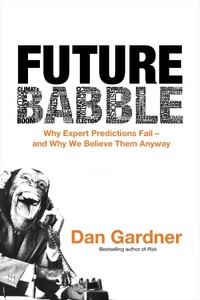The image is of the Canadian edition, which has a different subtitle than the American edition cited below. Source of book image: http://3.bp.blogspot.com/_qGSiMLu6NXM/TTWIQkcllmI/AAAAAAAADEI/qD2yo1rxnL0/s1600/Future%2BBabble.jpg
(p. C6) How bad are expert predictions? Almost predictably bad. In 2005, Philip Tetlock, a professor of psychology at the University of Pennsylvania, published the results of a magisterial 20-year analysis of 27,450 judgments about the future from 284 experts. He discovered that the experts, in aggregate, did little better, and sometimes considerably worse, than “a dart-throwing chimpanzee.”
While Mr. Tetlock guaranteed anonymity to get his experts to reveal how useless they were, Mr. Gardner names names. In the late 1960s, he notes, the political scientist Andrew Hacker predicted that race relations in America would soon get so bad that they would lead to the “dynamiting of bridges and water mains” and the “assassinating of public officials and private luminaries.” In the early 1970s, Richard Falk, at Princeton, imagined that by the 1990s we would be living in a world dominated by “the politics of catastrophe.” In the mid-1970s, Daniel Bell and other analysts assumed that high levels of inflation were, as Mr. Gardner puts it, “here to stay.” (In fact, inflation cooled off in the early 1980s and has stayed low for decades.) In the early 1990s, Lester Thurow, the MIT economist, was one of the experts who predicted that Japan would dominate the 21st century, though he noted that Europe had a chance, too.
The high priest of erroneous prediction is, of course, Paul Ehrlich, who, though a respected entomologist, turned into an end-of-the-worlder with “The Population Bomb” (1968) and “The End of Affluence” (1974). In the latter book he wrote: “If I were a gambler, I would take even money that England will not exist in the year 2000.” Now 77, Mr. Ehrlich is “a gregarious and delightful man, a natural performer,” Mr. Gardner reports, thereby tapping into the sources of his success in the face of repeated failure: Never admit mistakes, never sound doubtful. As Mr. Gardner shows in his survey of expert prediction-making, the more you sound like you know what you are talking about, the more people will believe you.
For the full review, see:
TREVOR BUTTERWORTH. “Prophets of Error.” Wall Street Journal (Sat., APRIL 30, 2011): C6.
(Note: the online version of the article is dated APRIL 30, 2011.)
The book being reviewed, is:
Gardner, Dan. Future Babble: Why Expert Predictions Are Next to Worthless, and You Can Do Better. New York: Dutton Adult, 2011.
The important Tetlock book mentioned, is:
Tetlock, Philip E. Expert Political Judgment: How Good Is It? How Can We Know? Princeton, NJ: Princeton University Press, 2005.

